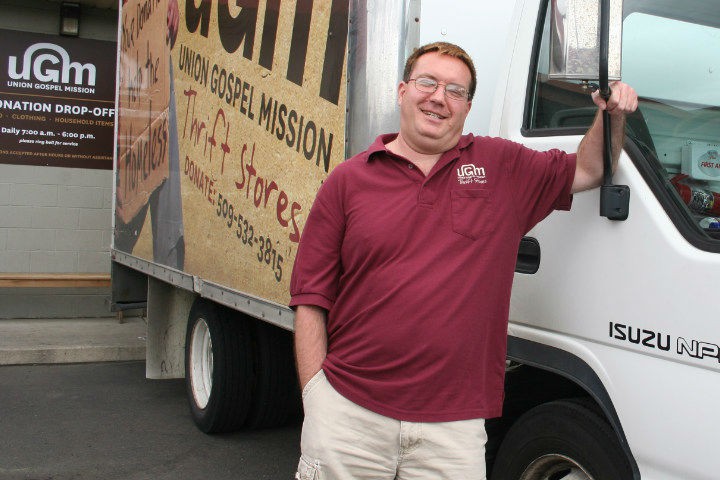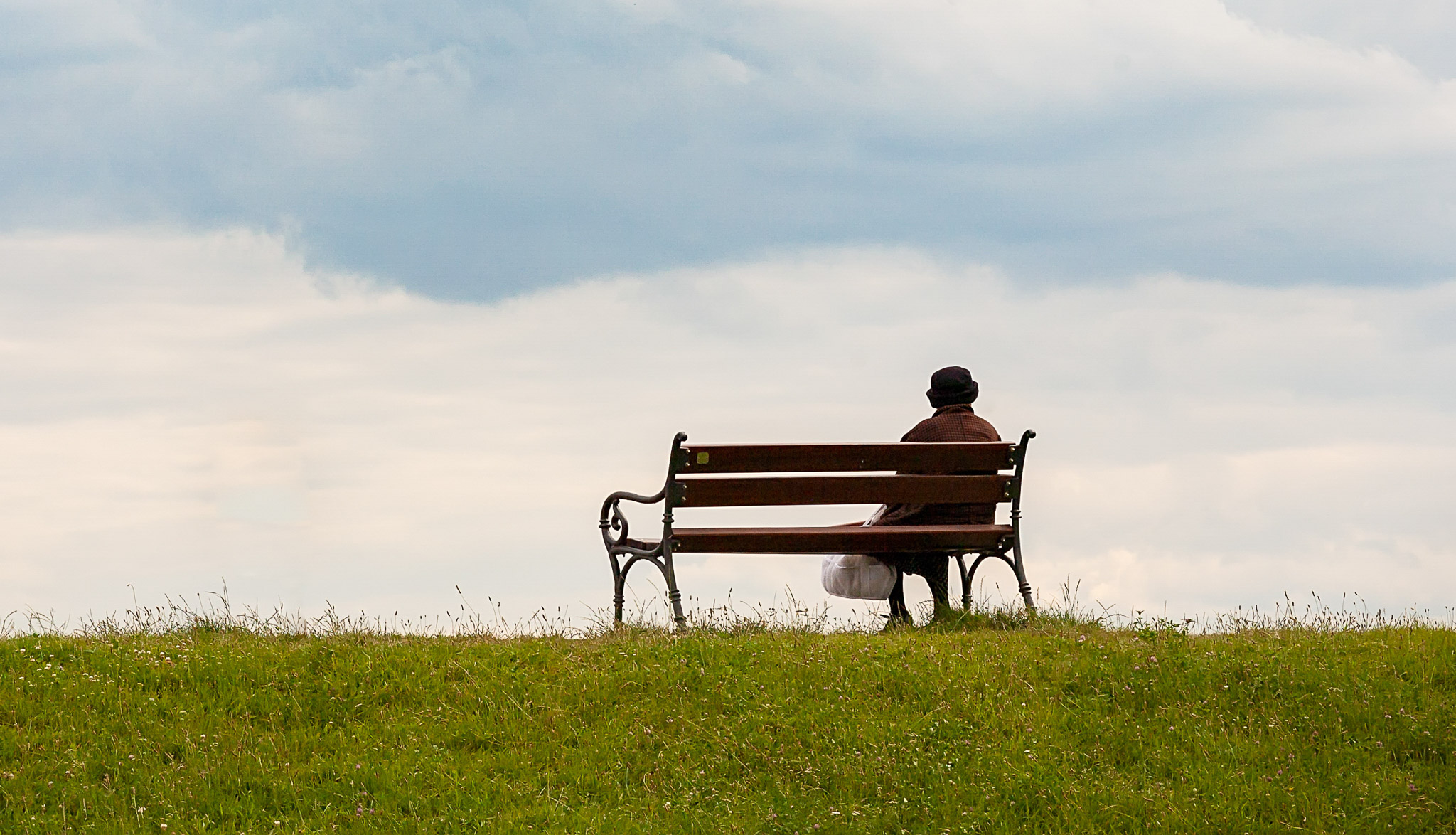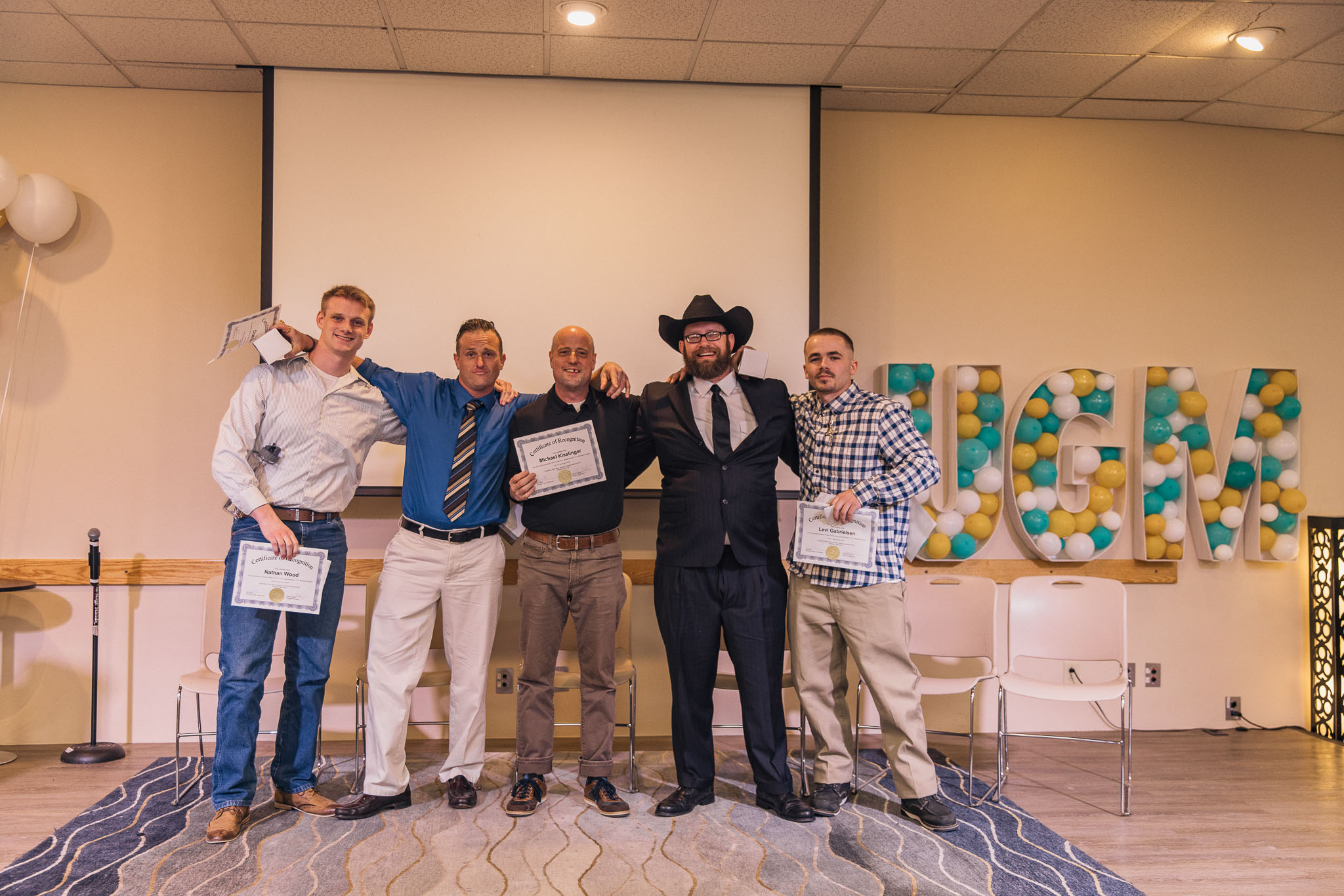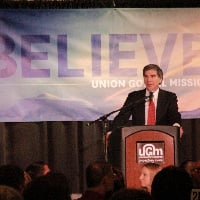2 min read
Gospel-Centered from the Start
“Let us hold unswervingly to the hope we profess, for He Who promised is faithful…Jesus Christ is the same yesterday, today, and forever.” (Hebrews...
 Sean Stevens graduated from the Men’s Recovery Program in 2011 and is working as the donations driver for the Union Gospel Mission Thrift Store in downtown Spokane. “I get out and talk about the Mission every day, talk about God with everybody.” The “what’s not to love” was evident in his enthusiasm. Just before he delivered the key note address to the 2012 UGM Graduates at the June celebration, he sat down to bring us up to date on what’s happening in his life.
Sean Stevens graduated from the Men’s Recovery Program in 2011 and is working as the donations driver for the Union Gospel Mission Thrift Store in downtown Spokane. “I get out and talk about the Mission every day, talk about God with everybody.” The “what’s not to love” was evident in his enthusiasm. Just before he delivered the key note address to the 2012 UGM Graduates at the June celebration, he sat down to bring us up to date on what’s happening in his life.
UGM: What’s it like to work for the Thrift Store?
Sean: I really like it because we have our morning devotional where we can sit around and talk about God, learn about the Bible. We have the fun, family atmosphere, and we can all be a family together. That’s really good to go face the day with.
UGM: Tell us about your church, Covenant Spokane.
Sean: One of the big things Jerry and the other program team members stressed was get in a local church. I listened. The church just accepted me right away. Even though they knew where I came from, they were just like, come on, let’s go do something together. Let’s go hang out and talk, and the pastors are still that way with me. Two weeks ago on my day off, one of the elders called and said, “Hey, I’ve got the afternoon off. Let’s go out for coffee.”
I’m an integral part of the church, working in the children’s ministry, running one of the services for the children’s ministry (5 to 12 year olds). We have a skit and sermon for them every Sunday and every other Wednesday night.
UGM: Is that a good fit?
Sean: It’s a perfect fit. The children react to me well. I want the children to get what I didn’t have. They know the Bible and the stories and they know they have a support group other than their parents. The single moms know they have another healthy male figure in their children’s lives.
UGM: We talk a lot about ongoing recovery. Why does recovery need to be ongoing?
Sean: I had 40 years of unhealthy living, and as much as I was given the tools, life still goes on, and you still have unhealthy stuff out there. You still need help getting through life. You need someone you can be honest with and tell all your problems to. I don’t think you’re ever totally healed. You’re supposed to keep on in recovery, dealing with life in healthy ways.
Ongoing recovery for me is staying in a Christ-centered environment. If I’m in recovery through my church, then I’m not out in places I’m not supposed to be or hanging out with people I shouldn’t be. The church is uplifting and keeps me focused on what I should be.
UGM: Can you still have fun?
Sean: There’s a lot of Christian fun. Instead of having a bachelor party, we play paint ball. We’ll all go out and do a football game together. I’m around a lot of people that have a lot of fun. I think I’m having more fun today just because I can be who I want to be.
UGM: Your military service played a part in your addiction. How do you feel about that now?
Sean: I’m learning to accept my military service more and more and accept that I actually contributed and did something for the country where I didn’t think that a couple years ago. It was hard for me when I got out of the military because I didn’t get out under good circumstances, so it was like I wasted 17 years, and I didn’t do anything. I was angry a lot. As time has gone by, people I value have said, “Don’t let that time go to waste. You actually did something. It’s made you who you are today, but it’s not who you are.”
UGM: In our last interview, you shared how difficult it was to talk about some of the things you saw in the military. Has that changed?
Sean: I have people I trust to talk with. They don’t judge. They know I just need to process stuff so that it won’t keep replaying in my head . . . especially late at night when everything’s bad. If you talk about it and get it out into the light, it’s not going to replay in your head a million times and be the worst thing. They’re able to listen.
Of the stuff we saw in war, with the PTSD, your brain kind of collapses in on itself and tries to hide that part to save the rest of your brain, but if you talk about it, then you get it out there and your brain doesn’t have to protect itself so much.
UGM: You were involved with the World War II vets at the Armed Forces Torch Light Parade. What was that like?
Sean: I wanted to show honor to the people who are getting older. We don’t have that many World War II veterans any more. They’re dying off at over 1,000 a day, and to honor these guys that are getting older and deserve that honor. You know, they changed a world. I just wanted to be there and talk to them and help them get the honor.
It was a lot of healing for me also. They are such heroes. I was talking to a guy from the 82nd Airborne. He did three combat jumps and then got injured in the Battle of the Bulge. I talked to him, and he’s like, “Oh, I didn’t do anything. We were just there. You’re talking like you were in the military,” and I said, “Yeah, I did 17 years.” And he’s like, “You guys were the heroes.” I was like, what? For a guy like that who’s a real hero to say that . . .maybe I did do something.

2 min read
“Let us hold unswervingly to the hope we profess, for He Who promised is faithful…Jesus Christ is the same yesterday, today, and forever.” (Hebrews...

9 min read
To celebrate 75 years of serving the Inland Northwest, we are spending the year remembering our history and the faithfulness that built us and...

2 min read
In 2026, Union Gospel Mission Inland Northwest is approaching our 75th Anniversary! This is a milestone that invites gratitude and reflection, and...

At Union Gospel Mission, healing often begins with looking back. As part of our Life Recovery Program, participants are invited to reflect on their...

Homelessness is a deeply layered crisis—one that requires compassion, resilience, and community to overcome. Because of your support, we don’t walk...

"BELIEVE" was the theme of UGM's Annual Banquet this year. The event was full of amazing stories of life transformation: men and women changed from...